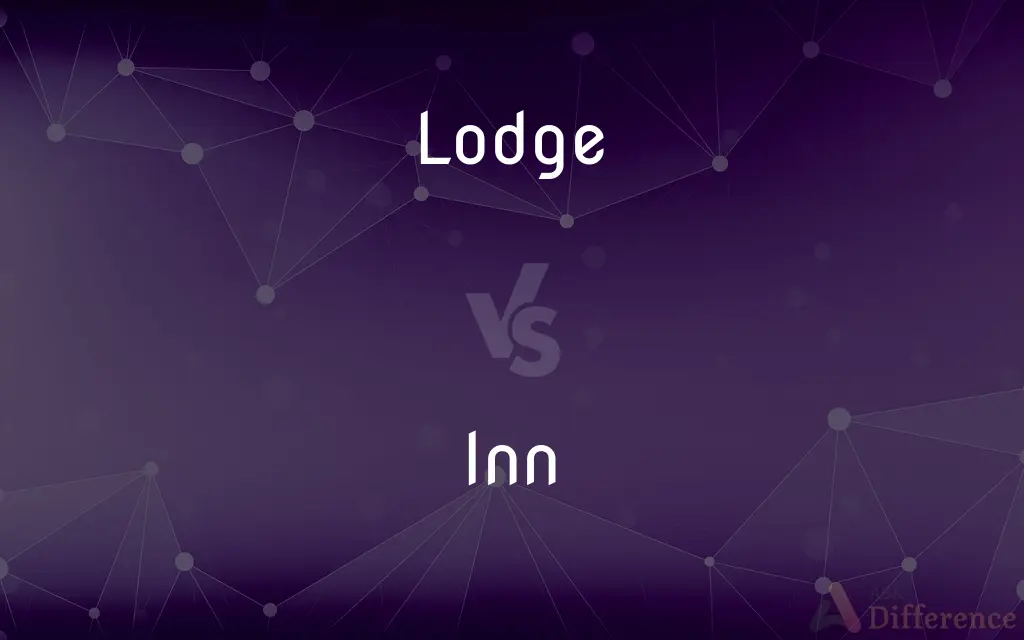Lodge vs. Inn — What's the Difference?
Edited by Tayyaba Rehman — By Fiza Rafique — Updated on September 30, 2023
A lodge is typically a rustic or remote dwelling, often in natural settings like forests or mountains. An inn is a small establishment offering accommodations, often with food and drink, usually located along travel routes.

Difference Between Lodge and Inn
Table of Contents
ADVERTISEMENT
Key Differences
A lodge is primarily known for its location, which is often in wilderness or scenic settings like mountains, forests, or lakes. It provides accommodations, and its design often complements the natural surroundings. An inn, conversely, is traditionally located in towns or along highways, offering travelers a place to rest, and may also provide meals.
Lodges are frequently associated with specific activities catered to their environment, such as hunting, fishing, or skiing. They serve as retreats for individuals seeking a connection with nature. Inns, on the other hand, have historically been stops for travelers, and might not necessarily emphasize activities beyond providing shelter and sustenance.
The architecture and ambiance of a lodge usually emphasize rustic, natural elements, giving guests a cozy and immersive experience in the environment. In contrast, an inn's design can be varied, from historic to contemporary, but its primary focus remains providing a comfortable stay for passersby.
Historically, lodges might not have always offered comprehensive services like restaurants or room service, emphasizing the retreat aspect. Inns, however, have frequently combined accommodations with dining, offering weary travelers both rest and refreshment in one location.
In modern times, while the distinctions between a lodge and an inn can sometimes blur, the primary difference often lies in their settings and the experiences they aim to provide. A lodge leans towards nature-oriented retreats, while an inn focuses on transient accommodations.
ADVERTISEMENT
Comparison Chart
Primary Setting
Natural settings like forests or mountains
Towns or along travel routes
Associated Activities
Often related to environment (e.g., skiing, fishing)
Primarily lodging, sometimes dining
Ambiance/Design
Rustic, nature-oriented
Can vary, often focused on comfort for travelers
Services
Accommodations, may not always have full services
Accommodations, often combined with dining or tavern
Historical Usage
Retreats in nature
Stops for travelers, combined rest and dining
Compare with Definitions
Lodge
Lodge can refer to a branch or meeting place of an organization.
He attended the weekly meeting at the Masonic lodge.
Inn
Inn can imply a tavern or pub, especially in British usage.
They met at the local inn for a pint.
Lodge
Lodge is a small house at the gates of a park or in the grounds of a large house.
The caretaker lives in the lodge by the entrance.
Inn
Inn often emphasizes hospitality and a welcoming environment.
The innkeeper greeted the guests with warmth.
Lodge
An often rustic building used as a temporary abode or shelter
A ski lodge.
Inn
Inn is a place providing temporary accommodations.
The weary traveler sought shelter at the nearest inn.
Lodge
A small house on the grounds of an estate or a park, used by a caretaker or gatekeeper.
Inn
Inn is a small establishment offering travelers accommodations and, often, food and drink.
We stayed at a quaint inn in the countryside.
Lodge
An inn.
Inn
Inns are generally establishments or buildings where travelers can seek lodging, and usually, food and drink. Inns are typically located in the country or along a highway; before the advent of motorized transportation they also provided accommodation for horses.
Lodge
Any of various Native American dwellings, such as a hogan, wigwam, or longhouse.
Inn
A public lodging house serving food and drink to travelers; a hotel.
Lodge
The group living in such a dwelling.
Inn
A tavern or restaurant.
Lodge
A local chapter of certain fraternal organizations.
Inn
Chiefly British Formerly, a residence hall for students, especially law students, in London.
Lodge
The meeting hall of such a chapter.
Inn
Any establishment where travellers can procure lodging, food, and drink.
Lodge
The members of such a chapter.
Inn
A tavern.
Lodge
The den of certain animals, such as the dome-shaped structure built by beavers.
Inn
One of the colleges (societies or buildings) in London, for students of the law barristers.
The Inns of Court
The Inns of Chancery
Serjeants’ Inns
Lodge
To provide with temporary quarters, especially for sleeping
Lodges travelers in the shed.
Inn
The town residence of a nobleman or distinguished person.
Leicester Inn
Lodge
To rent a room to.
Inn
(obsolete) A place of shelter; hence, dwelling; habitation; residence; abode.
Lodge
To place or establish in quarters
Lodged the children with relatives after the fire.
Inn
To house; to lodge.
Lodge
To serve as a depository for; contain
This cellar lodges our oldest wines.
Inn
To take lodging; to lodge.
Lodge
To place, leave, or deposit, as for safety
Documents lodged with a trusted associate.
Inn
A place of shelter; hence, dwelling; habitation; residence; abode.
Therefore with me ye may take up your innFor this same night.
Lodge
To fix, force, or implant
Lodge a bullet in a wall.
Inn
A house for the lodging and entertainment of travelers or wayfarers; a tavern; a public house; a hotel.
The miserable fare and miserable lodgment of a provincial inn.
Lodge
To register (a charge or complaint, for example) before an authority, such as a court; file.
Inn
The town residence of a nobleman or distinguished person; as, Leicester Inn.
Lodge
To vest (authority, for example).
Inn
One of the colleges (societies or buildings) in London, for students of the law barristers; as, the Inns of Court; the Inns of Chancery; Serjeants' Inns.
Lodge
To beat (crops) down flat
Rye lodged by the cyclone.
Inn
To take lodging; to lodge.
Lodge
To live in a place temporarily.
Inn
To house; to lodge.
When he had brought them into his cityAnd inned them, everich at his degree.
Lodge
To rent accommodations, especially for sleeping.
Inn
A hotel providing overnight lodging for travelers
Lodge
To be or become embedded
The ball lodged in the fence.
Inn
Inn historically refers to a place where travelers could rest and get refreshments.
The old inn has been operating since the 1700s.
Lodge
A building for recreational use such as a hunting lodge or a summer cabin.
Lodge
: a building or room near the entrance of an estate or building, especially as a college mailroom.
Lodge
A local chapter of some fraternities, such as freemasons.
Lodge
(US) A local chapter of a trade union.
Lodge
A rural hotel or resort, an inn.
Lodge
A beaver's shelter constructed on a pond or lake.
Lodge
A den or cave.
Lodge
The chamber of an abbot, prior, or head of a college.
Lodge
(mining) The space at the mouth of a level next to the shaft, widened to permit wagons to pass, or ore to be deposited for hoisting; called also platt.
Lodge
A collection of objects lodged together.
Lodge
An indigenous American home, such as tipi or wigwam. By extension, the people who live in one such home; a household.
Lodge
(historic) A family of Native Americans, or the persons who usually occupy an Indian lodge; as a unit of enumeration, reckoned from four to six persons.
The tribe consists of about two hundred lodges, that is, of about a thousand individuals.
Lodge
(intransitive) To be firmly fixed in a specified position.
The bullet missed its target and lodged in the bark of a tree.
Lodge
(transitive) To firmly fix in a specified position.
I've got some spinach lodged between my teeth.
Lodge
(intransitive) To stay in a boarding-house, paying rent to the resident landlord or landlady.
The detective Sherlock Holmes lodged in Baker Street.
Lodge
(intransitive) To stay in any place or shelter.
Lodge
(transitive) To drive (an animal) to covert.
Lodge
(transitive) To supply with a room or place to sleep in for a time.
Lodge
(transitive) To put money, jewellery, or other valuables for safety.
Lodge
(transitive) To place (a statement, etc.) with the proper authorities (such as courts, etc.).
Lodge
(intransitive) To become flattened, as grass or grain, when overgrown or beaten down by the wind.
The heavy rain caused the wheat to lodge.
Lodge
(transitive) To cause to flatten, as grass or grain.
Lodge
A shelter in which one may rest;
Their lodges and their tentis up they gan bigge [to build].
O for a lodge in some vast wilderness!
Lodge
A small dwelling house, as for a gamekeeper or gatekeeper of an estate.
Lodge
The space at the mouth of a level next the shaft, widened to permit wagons to pass, or ore to be deposited for hoisting; - called also platt.
Lodge
A collection of objects lodged together.
The Maldives, a famous lodge of islands.
Lodge
A family of North American Indians, or the persons who usually occupy an Indian lodge, - as a unit of enumeration, reckoned from four to six persons; as, the tribe consists of about two hundred lodges, that is, of about a thousand individuals.
Lodge
To rest or remain a lodge house, or other shelter; to rest; to stay; to abide; esp., to sleep at night; as, to lodge in York Street.
Stay and lodge by me this night.
Something holy lodges in that breast.
Lodge
To fall or lie down, as grass or grain, when overgrown or beaten down by the wind.
Lodge
To come to a rest; to stop and remain; to become stuck or caught; as, the bullet lodged in the bark of a tree; a piece of meat lodged in his throat.
Lodge
To give shelter or rest to; especially, to furnish a sleeping place for; to harbor; to shelter; hence, to receive; to hold.
Every house was proud to lodge a knight.
The memory can lodge a greater store of images than all the senses can present at one time.
Lodge
To drive to shelter; to track to covert.
The deer is lodged; I have tracked her to her covert.
Lodge
To deposit for keeping or preservation; as, the men lodged their arms in the arsenal.
Lodge
To cause to stop or rest in; to implant.
He lodged an arrow in a tender breast.
Lodge
To lay down; to prostrate.
Though bladed corn be lodged, and trees blown down.
Lodge
To present or bring (information, a complaint) before a court or other authority; as, to lodge a complaint.
Lodge
English physicist who studied electromagnetic radiation and was a pioneer of radiotelegraphy (1851-1940)
Lodge
A formal association of people with similar interests;
He joined a golf club
They formed a small lunch society
Men from the fraternal order will staff the soup kitchen today
Lodge
Small house at the entrance to the grounds of a country mansion; usually occupied by a gatekeeper or gardener
Lodge
A small (rustic) house used as a temporary shelter
Lodge
Any of various native American dwellings
Lodge
A hotel providing overnight lodging for travelers
Lodge
Be a lodger; stay temporarily;
Where are you lodging in Paris?
Lodge
Fix, force, or implant;
Lodge a bullet in the table
Lodge
File a formal charge against;
The suspect was charged with murdering his wife
Lodge
Provide housing for;
We are lodging three foreign students this semester
Lodge
Lodge is a dwelling or retreat in wilderness settings.
The family spent their vacation at a mountain lodge.
Lodge
Lodge can mean to provide shelter or accommodation.
She lodged the students in her spare rooms.
Lodge
Lodge implies embedding or getting stuck in a particular place.
The splinter lodged in my finger.
Common Curiosities
Are all lodges in remote areas?
While many lodges are in remote or scenic settings, not all are necessarily isolated.
What's the primary setting for a lodge?
A lodge is typically set in natural surroundings like forests or mountains.
Do lodges typically offer activities related to their environment?
Yes, lodges often offer activities like skiing, fishing, or hiking related to their settings.
Can a lodge be part of an organization?
Yes, "lodge" can also refer to a branch or meeting place of certain organizations, like the Masons.
Is food always available at an inn?
Many inns offer food, but it's not a strict rule; some may only provide lodging.
Can an inn be found in a city?
Yes, while many inns are in towns or along highways, some can be found in urban settings.
Can "lodge" also mean to file a formal complaint?
Yes, "lodge" can also mean to submit or register, as in "lodge a complaint."
What's the primary purpose of an inn?
The primary purpose of an inn is to provide travelers with accommodations and often food.
Is an inn more urban compared to a lodge?
Yes, inns are usually located in towns or along travel routes, catering to travelers.
Would I find a tavern in an inn?
Historically, inns often had taverns, providing both food and drink to travelers.
Are lodges usually more expensive than inns?
It depends on the services and location, but lodges in prime natural settings might be pricier.
Can inns be considered hotels?
Inns are similar to hotels but are usually smaller and may have a more personal or historic touch.
How old is the concept of an inn?
The concept of inns dates back centuries, serving as resting places for travelers throughout history.
Is a lodge always made of wood?
While many lodges have a rustic, wooden design, they can be made of various materials.
Do lodges and inns both cater to tourists?
Yes, both lodges and inns cater to tourists, but they offer different experiences based on their settings and services.
Share Your Discovery

Previous Comparison
Essential vs. Indispensable
Next Comparison
Next vs. OppositeAuthor Spotlight
Written by
Fiza RafiqueFiza Rafique is a skilled content writer at AskDifference.com, where she meticulously refines and enhances written pieces. Drawing from her vast editorial expertise, Fiza ensures clarity, accuracy, and precision in every article. Passionate about language, she continually seeks to elevate the quality of content for readers worldwide.
Edited by
Tayyaba RehmanTayyaba Rehman is a distinguished writer, currently serving as a primary contributor to askdifference.com. As a researcher in semantics and etymology, Tayyaba's passion for the complexity of languages and their distinctions has found a perfect home on the platform. Tayyaba delves into the intricacies of language, distinguishing between commonly confused words and phrases, thereby providing clarity for readers worldwide.














































